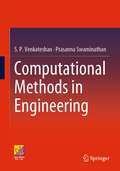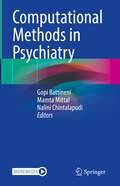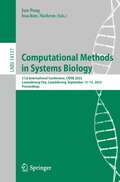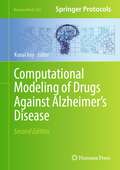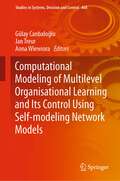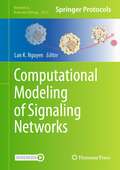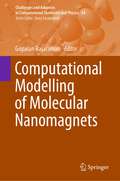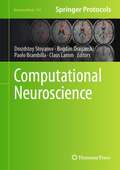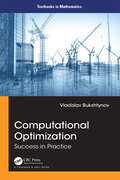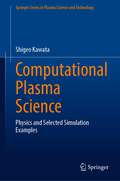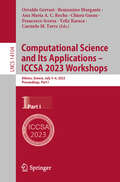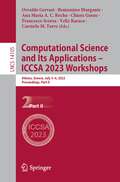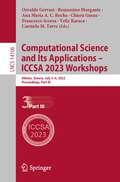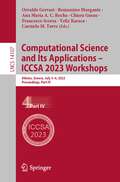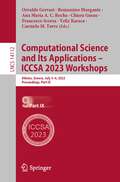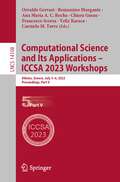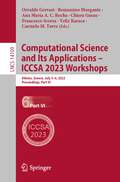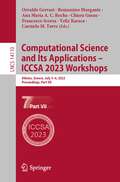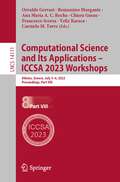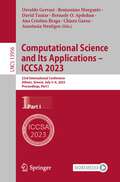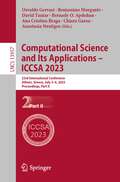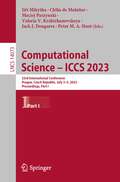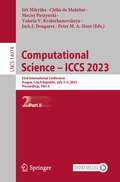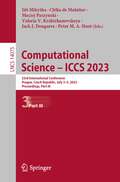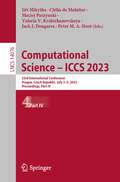- Table View
- List View
Computational Methods in Engineering
by S. P. Venkateshan Prasanna SwaminathanThe book is designed to serve as a textbook for courses offered to graduate and upper-undergraduate students enrolled in mechanical engineering. The book attempts to make students with mathematical backgrounds comfortable with numerical methods. The book also serves as a handy reference for practicing engineers who are interested in applications. The book is written in an easy-to-understand manner, with the essence of each numerical method clearly stated. This makes it easy for professional engineers, students, and early career researchers to follow the material presented in the book. The structure of the book has been modeled accordingly. It is divided into four modules: i) solution of a system of equations and eigenvalues which includes linear equations, determining eigenvalues, and solution of nonlinear equations; ii) function approximations: interpolation, data fit, numerical differentiation, and numerical integration; iii) solution of ordinary differential equations—initial value problems and boundary value problems; and iv) solution of partial differential equations—parabolic, elliptic, and hyperbolic PDEs. Each section of the book includes exercises to reinforce the concepts, and problems have been added at the end of each chapter. Exercise problems may be solved by using computational tools such as scientific calculators, spreadsheet programs, and MATLAB codes. The detailed coverage and pedagogical tools make this an ideal textbook for students, early career researchers, and professionals.
Computational Methods in Psychiatry
by Mamta Mittal Gopi Battineni Nalini ChintalapudiThis book presents a particular area of interest in computing psychiatry with the modelling of mood and anxiety disorders. It highlights various methods for building these models. Clinical applications are prevalent due to the growth and interaction of these multiple approaches. Besides, it outlines some original predictive and computational modelling ideas for enhancing psychological treatment interventions. Computational psychiatry combines multiple levels and types of computation with different data types to improve mental illness understanding, prediction, and treatment.
Computational Methods in Systems Biology: 21st International Conference, CMSB 2023, Luxembourg City, Luxembourg, September 13–15, 2023, Proceedings (Lecture Notes in Computer Science #14137)
by Jun Pang Joachim NiehrenThis book constitutes the refereed proceedings of the 21st International Conference on Computational Methods in Systems Biology, CMSB 2023, held in Luxembourg City, Luxembourg, during September 13–15, 2023. The 14 full papers and 3 tool papers presented in this book were carefully reviewed and selected from 28 submissions. CMSB focuses on modeling, simulation, analysis, design and control of biological systems and covers the broad field of computational methods and tools in systems and synthetic biology and their applications.
Computational Modeling of Drugs Against Alzheimer’s Disease (Neuromethods #203)
by Kunal RoyThis second edition volume expands on the previous edition with updated descriptions on different computational methods encompassing ligand-based, structure-based, and combined approaches with their recent applications in anti-Alzheimer drug design. Different background topics like recent advancements in research on the development of novel therapies and their implications in the treatment of Alzheimer’s Disease (AD) have also been covered for completeness. Special topics like basic information science methods for insight into neurodegenerative pathogenesis, drug repositioning and network pharmacology, and online tools to predict ADMET behavior with reference to anti-Alzheimer drug development have also been included. In the Neuromethods series style, chapter include the kind of detail and key advice from the specialists needed to get successful results in your laboratory.Cutting-edge and thorough, Computational Modeling of Drugs Against Alzheimer’s Disease, Second Edition is a valuable resource for all researchers and scientists interested in learning more about this important and developing field.
Computational Modeling of Multilevel Organisational Learning and Its Control Using Self-modeling Network Models (Studies in Systems, Decision and Control #468)
by Jan Treur Gülay Canbaloğlu Anna WiewioraAlthough there is much literature on organisational learning, mathematical formalisation and computational simulation, there is no literature that uses mathematical modelling and simulation to represent and explore different facets of multilevel learning. This book provides an overview of recent work on mathematical formalisation and computational simulation of multilevel organisational learning by exploiting the possibilities of self-modeling network models to address it. This is the first book addressing mathematical formalisation and computational modeling of multilevel organisational learning in a systematic, principled manner. A self-modeling network modeling approach from AI and Network Science is used where in a reflective manner some of the network nodes (called self-model nodes) represent parts of the network’s own network structure characteristics. This is supported by a dedicated software environment allowing to design and implement (higher-order) adaptive network models by specifying them in a conceptual manner at a high level of abstraction in a standard table format, without any need of algorithmic specification or programming. This modeling approach allows to model the development of knowledge in an organisational setting in a neatly structured manner at three different levels for the usage, adaptation and control, respectively, of the underlying mental models. Several examples of realistic cases of multilevel organisational learning are used to illustrate the approach. Crucial concepts such as the aggregation of mental models to form shared mental models out of individual mental models are addressed extensively. It is shown how to model context-sensitive control of organisational learning taking into account a wide variety of context factors, for example relating to levels of expertise of individuals or to leadership styles of managers involved. Mathematical equilibrium analysis of models of organisational learning is also addressed, among others allowing verification of correctness of the implemental models in comparison to their conceptual design. Chapters in this book also contribute to the Management and Business Sciences research by demonstrating how computational modeling can be used to capture complex management phenomena such as multilevel organizational learning. This book has a potential implication for practice by demonstrating how computational modeling can be used to capture learning scenarios, which then provide a basis for more informed managerial decisions.
Computational Modeling of Signaling Networks (Methods in Molecular Biology #2634)
by Lan K. NguyenThis volume focuses on the computational modeling of cell signaling networks and the application of these models and model-based analysis to systems and personalized medicine. Chapters guide readers through various modeling approaches for signaling networks, new methods and techniques that facilitate model development and analysis, and new applications of signaling network modeling towards systems and personalized treatment of cancer. Written in the format of the highly successful Methods in Molecular Biology series, each chapter includes an introduction to the topic, lists necessary materials and methods, includes tips on troubleshooting and known pitfalls, and step-by-step, readily reproducible protocols. Authoritative and cutting-edge, Computational Modeling of Signaling Networks aims to benefit a wide spectrum of readers including researchers from the biological as well as computational systems biology communities.
Computational Modelling of Molecular Nanomagnets (Challenges and Advances in Computational Chemistry and Physics #34)
by Gopalan RajaramanThis book summarizes the state-of-the-art advances in the area of computational modelling of molecule-based magnets. Nowadays, various computational tools based on DFT, ab initio methods and other techniques are gaining attention in molecular nanomagnets and are successfully used to solve several outstanding problems in this area. This contributed volume discusses the theoretical foundation of the modelling of molecular magnets, starting from fitting the experimental magnetic data of very large molecules to the theory of pseudo-spin Hamiltonian approach and spin-phonon relaxations mechanisms, while it also presents examples of contemporary applications of both transition metal and lanthanide molecular magnets. In addition, the transport characteristics of molecules when placed at an interface and how these assemble on surfaces are also reviewed. This book is a great tool for researchers working in the fields of molecular magnetism and computational/theoretical chemistry and will also benefit graduate students specializing in physical-inorganic chemistry and molecular modelling.Chapter 6 is available open access under a Creative Commons Attribution 4.0 International License via link.springer.com.
Computational Neuroscience (Neuromethods #199)
by Paolo Brambilla Drozdstoy Stoyanov Bogdan Draganski Claus LammThis volume looks at the latest advancements in imaging neuroscience methods using magnetic resonance imaging (MRI) and electroencephalography (EEG) to study the healthy and diseased brain. The chapters in this book are organized into five parts. Parts One and Two cover an introduction to this field and the latest use of molecular models. Part Three explores neurophysiological methods for assessment, such as quantitative EEG and event-related potentials. Part Four discusses the advances and innovations made in computational anatomy, and Part Five addresses the challenges faced by researchers prior to the computational neuroscience to find wider translational applications in the field of psychiatry and mental health. In the Neuromethods series style, chapters include the kind of detail and key advice from the specialists needed to get successful results in your laboratory. Cutting-edge and comprehensive, Computational Neuroscience is a valuable tool for researchers in the psychiatry and mental health fields who want to learn more about ways to incorporate computational approaches into utility and validity of clinical methods.
Computational Optimization: Success in Practice (Textbooks in Mathematics)
by Vladislav BukshtynovThis textbook offers a guided tutorial that reviews the theoretical fundamentals while going through the practical examples used for constructing the computational frame, applied to various real-life models. Computational Optimization: Success in Practice will lead the readers through the entire process. They will start with the simple calculus examples of fitting data and basics of optimal control methods and end up constructing a multi-component framework for running PDE-constrained optimization. This framework will be assembled piece by piece; the readers may apply this process at the levels of complexity matching their current projects or research needs. By connecting examples with the theory and discussing the proper "communication" between them, the readers will learn the process of creating a "big house." Moreover, they can use the framework exemplified in the book as the template for their research or course problems – they will know how to change the single "bricks" or add extra "floors" on top of that. This book is for students, faculty, and researchers. Features The main optimization framework builds through the course exercises and centers on MATLAB®. All other scripts to implement computations for solving optimization problems with various models use only open-source software, e.g., FreeFEM. All computational steps are platform-independent; readers may freely use Windows, macOS, or Linux systems. All scripts illustrating every step in building the optimization framework will be available to the readers online. Each chapter contains problems based on the examples provided in the text and associated scripts. The readers will not need to create the scripts from scratch, but rather modify the codes provided as a supplement to the book. This book will prove valuable to graduate students of math, computer science, engineering, and all who explore optimization techniques at different levels for educational or research purposes. It will benefit many professionals in academic and industry-related research: professors, researchers, postdoctoral fellows, and the personnel of R&D departments.
Computational Plasma Science: Physics and Selected Simulation Examples (Springer Series in Plasma Science and Technology)
by Shigeo KawataThe book presents fundamentals of plasma physics with rich references and computational techniques in a concise manner. It particularly focuses on introductions to numerical simulation methods in plasma physics, in addition to those to physics and mathematics in plasma physics. It also presents the fundamentals of numerical methods, which solve mathematical models of plasmas, together with examples of numerical results. A discretization method, the so-called finite difference method, is introduced for particle-in-cell methods and fluid codes, which have been widely employed in plasma physics studies. In addition to the introduction to numerical solutions, it also covers numerical stability. The instabilities and numerical errors significantly influence the results, and for correct results, great efforts are required to avoid such numerical artifacts. The book also carefully discusses the numerical errors, numerical stability, and uncertainty in numerical computations. Readers are expected to have an understanding of fundamental physics of mechanics, electromagnetism, thermodynamics, statistical physics, relativity, fluid dynamics, and mathematics, but the book does not assume background knowledge on plasma. Therefore, it is a first book of plasma physics for upper undergraduate and early graduate students who are interested in learning it.
Computational Science and Its Applications – ICCSA 2023 Workshops: Athens, Greece, July 3–6, 2023, Proceedings, Part I (Lecture Notes in Computer Science #14104)
by Osvaldo Gervasi Beniamino Murgante Ana Maria A. C. Rocha Carmelo M. Torre Chiara Garau Yeliz Karaca Francesco ScorzaThis nine-volume set LNCS 14104 – 14112 constitutes the refereed workshop proceedings of the 23rd International Conference on Computational Science and Its Applications, ICCSA 2023, held at Athens, Greece, during July 3–6, 2023.The 350 full papers and 29 short papers and 2 PHD showcase papers included in this volume were carefully reviewed and selected from a total of 876 submissions. These nine-volumes includes the proceedings of the following workshops: Advances in Artificial Intelligence Learning Technologies: Blended Learning, STEM, Computational Thinking and Coding (AAILT 2023); Advanced Processes of Mathematics and Computing Models in Complex Computational Systems (ACMC 2023); Artificial Intelligence supported Medical data examination (AIM 2023); Advanced and Innovative web Apps (AIWA 2023); Assessing Urban Sustainability (ASUS 2023); Advanced Data Science Techniques with applications in Industry and Environmental Sustainability (ATELIERS 2023); Advances in Web Based Learning (AWBL 2023); Blockchain and Distributed Ledgers: Technologies and Applications (BDLTA 2023); Bio and Neuro inspired Computing and Applications (BIONCA 2023); Choices and Actions for Human Scale Cities: Decision Support Systems (CAHSC-DSS 2023); and Computational and Applied Mathematics (CAM 2023).
Computational Science and Its Applications – ICCSA 2023 Workshops: Athens, Greece, July 3–6, 2023, Proceedings, Part II (Lecture Notes in Computer Science #14105)
by Osvaldo Gervasi Beniamino Murgante Ana Maria A. C. Rocha Carmelo M. Torre Chiara Garau Yeliz Karaca Francesco ScorzaThis nine-volume set LNCS 14104 – 14112 constitutes the refereed workshop proceedings of the 23rd International Conference on Computational Science and Its Applications, ICCSA 2023, held at Athens, Greece, during July 3–6, 2023. The 350 full papers and 29 short papers and 2 PHD showcase papers included in this volume were carefully reviewed and selected from a total of 876 submissions. These nine-volumes includes the proceedings of the following workshops: Advances in Artificial Intelligence Learning Technologies: Blended Learning, STEM, Computational Thinking and Coding (AAILT 2023); Advanced Processes of Mathematics and Computing Models in Complex Computational Systems (ACMC 2023); Artificial Intelligence supported Medical data examination (AIM 2023); Advanced and Innovative web Apps (AIWA 2023); Assessing Urban Sustainability (ASUS 2023); Advanced Data Science Techniques with applications in Industry and Environmental Sustainability (ATELIERS 2023); Advances in Web Based Learning (AWBL 2023); Blockchain and Distributed Ledgers: Technologies and Applications (BDLTA 2023); Bio and Neuro inspired Computing and Applications (BIONCA 2023); Choices and Actions for Human Scale Cities: Decision Support Systems (CAHSC-DSS 2023); and Computational and Applied Mathematics (CAM 2023).
Computational Science and Its Applications – ICCSA 2023 Workshops: Athens, Greece, July 3–6, 2023, Proceedings, Part III (Lecture Notes in Computer Science #14106)
by Osvaldo Gervasi Beniamino Murgante Ana Maria A. C. Rocha Carmelo M. Torre Chiara Garau Yeliz Karaca Francesco ScorzaThis nine-volume set LNCS 14104 – 14112 constitutes the refereed workshop proceedings of the 23rd International Conference on Computational Science and Its Applications, ICCSA 2023, held at Athens, Greece, during July 3–6, 2023. The 350 full papers and 29 short papers and 2 PHD showcase papers included in this volume were carefully reviewed and selected from a total of 876 submissions. These nine-volumes includes the proceedings of the following workshops: Advances in Artificial Intelligence Learning Technologies: Blended Learning, STEM, Computational Thinking and Coding (AAILT 2023); Advanced Processes of Mathematics and Computing Models in Complex Computational Systems (ACMC 2023); Artificial Intelligence supported Medical data examination (AIM 2023); Advanced and Innovative web Apps (AIWA 2023); Assessing Urban Sustainability (ASUS 2023); Advanced Data Science Techniques with applications in Industry and Environmental Sustainability (ATELIERS 2023); Advances in Web Based Learning (AWBL 2023); Blockchain and Distributed Ledgers: Technologies and Applications (BDLTA 2023); Bio and Neuro inspired Computing and Applications (BIONCA 2023); Choices and Actions for Human Scale Cities: Decision Support Systems (CAHSC-DSS 2023); and Computational and Applied Mathematics (CAM 2023).
Computational Science and Its Applications – ICCSA 2023 Workshops: Athens, Greece, July 3–6, 2023, Proceedings, Part IV (Lecture Notes in Computer Science #14107)
by Osvaldo Gervasi Beniamino Murgante Ana Maria A. C. Rocha Carmelo M. Torre Chiara Garau Yeliz Karaca Francesco ScorzaThis nine-volume set LNCS 14104 – 14112 constitutes the refereed workshop proceedings of the 23rd International Conference on Computational Science and Its Applications, ICCSA 2023, held at Athens, Greece, during July 3–6, 2023.The 350 full papers and 29 short papers and 2 PHD showcase papers included in this volume were carefully reviewed and selected from a total of 876 submissions. These nine-volumes includes the proceedings of the following workshops: Advances in Artificial Intelligence Learning Technologies: Blended Learning, STEM, Computational Thinking and Coding (AAILT 2023); Advanced Processes of Mathematics and Computing Models in Complex Computational Systems (ACMC 2023); Artificial Intelligence supported Medical data examination (AIM 2023); Advanced and Innovative web Apps (AIWA 2023); Assessing Urban Sustainability (ASUS 2023); Advanced Data Science Techniques with applications in Industry and Environmental Sustainability (ATELIERS 2023); Advances in Web Based Learning (AWBL 2023); Blockchain and Distributed Ledgers: Technologies and Applications (BDLTA 2023); Bio and Neuro inspired Computing and Applications (BIONCA 2023); Choices and Actions for Human Scale Cities: Decision Support Systems (CAHSC-DSS 2023); and Computational and Applied Mathematics (CAM 2023).
Computational Science and Its Applications – ICCSA 2023 Workshops: Athens, Greece, July 3–6, 2023, Proceedings, Part IX (Lecture Notes in Computer Science #14112)
by Osvaldo Gervasi Beniamino Murgante Ana Maria A. C. Rocha Carmelo M. Torre Chiara Garau Yeliz Karaca Francesco ScorzaThis nine-volume set LNCS 14104 – 14112 constitutes the refereed workshop proceedings of the 23rd International Conference on Computational Science and Its Applications, ICCSA 2023, held at Athens, Greece, during July 3–6, 2023.The 350 full papers and 29 short papers and 2 PHD showcase papers included in this volume were carefully reviewed and selected from a total of 876 submissions. These nine-volumes includes the proceedings of the following workshops: Advances in Artificial Intelligence Learning Technologies: Blended Learning, STEM, Computational Thinking and Coding (AAILT 2023); Advanced Processes of Mathematics and Computing Models in Complex Computational Systems (ACMC 2023); Artificial Intelligence supported Medical data examination (AIM 2023); Advanced and Innovative web Apps (AIWA 2023); Assessing Urban Sustainability (ASUS 2023); Advanced Data Science Techniques with applications in Industry and Environmental Sustainability (ATELIERS 2023); Advances in Web Based Learning (AWBL 2023); Blockchain and Distributed Ledgers: Technologies and Applications (BDLTA 2023); Bio and Neuro inspired Computing and Applications (BIONCA 2023); Choices and Actions for Human Scale Cities: Decision Support Systems (CAHSC-DSS 2023); and Computational and Applied Mathematics (CAM 2023).
Computational Science and Its Applications – ICCSA 2023 Workshops: Athens, Greece, July 3–6, 2023, Proceedings, Part V (Lecture Notes in Computer Science #14108)
by Osvaldo Gervasi Beniamino Murgante Ana Maria A. C. Rocha Carmelo M. Torre Chiara Garau Yeliz Karaca Francesco ScorzaThis nine-volume set LNCS 14104 – 14112 constitutes the refereed workshop proceedings of the 23rd International Conference on Computational Science and Its Applications, ICCSA 2023, held at Athens, Greece, during July 3–6, 2023. The 350 full papers and 29 short papers and 2 PHD showcase papers included in this volume were carefully reviewed and selected from a total of 876 submissions. These nine-volumes includes the proceedings of the following workshops: Advances in Artificial Intelligence Learning Technologies: Blended Learning, STEM, Computational Thinking and Coding (AAILT 2023); Advanced Processes of Mathematics and Computing Models in Complex Computational Systems (ACMC 2023); Artificial Intelligence supported Medical data examination (AIM 2023); Advanced and Innovative web Apps (AIWA 2023); Assessing Urban Sustainability (ASUS 2023); Advanced Data Science Techniques with applications in Industry and Environmental Sustainability (ATELIERS 2023); Advances in Web Based Learning (AWBL 2023); Blockchain and Distributed Ledgers: Technologies and Applications (BDLTA 2023); Bio and Neuro inspired Computing and Applications (BIONCA 2023); Choices and Actions for Human Scale Cities: Decision Support Systems (CAHSC-DSS 2023); and Computational and Applied Mathematics (CAM 2023).
Computational Science and Its Applications – ICCSA 2023 Workshops: Athens, Greece, July 3–6, 2023, Proceedings, Part VI (Lecture Notes in Computer Science #14109)
by Osvaldo Gervasi Beniamino Murgante Ana Maria A. C. Rocha Carmelo M. Torre Chiara Garau Yeliz Karaca Francesco ScorzaThis nine-volume set LNCS 14104 – 14112 constitutes the refereed workshop proceedings of the 23rd International Conference on Computational Science and Its Applications, ICCSA 2023, held at Athens, Greece, during July 3–6, 2023. The 350 full papers and 29 short papers and 2 PHD showcase papers included in this volume were carefully reviewed and selected from a total of 876 submissions. These nine-volumes includes the proceedings of the following workshops: Advances in Artificial Intelligence Learning Technologies: Blended Learning, STEM, Computational Thinking and Coding (AAILT 2023); Advanced Processes of Mathematics and Computing Models in Complex Computational Systems (ACMC 2023); Artificial Intelligence supported Medical data examination (AIM 2023); Advanced and Innovative web Apps (AIWA 2023); Assessing Urban Sustainability (ASUS 2023); Advanced Data Science Techniques with applications in Industry and Environmental Sustainability (ATELIERS 2023); Advances in Web Based Learning (AWBL 2023); Blockchain and Distributed Ledgers: Technologies and Applications (BDLTA 2023); Bio and Neuro inspired Computing and Applications (BIONCA 2023); Choices and Actions for Human Scale Cities: Decision Support Systems (CAHSC-DSS 2023); and Computational and Applied Mathematics (CAM 2023).
Computational Science and Its Applications – ICCSA 2023 Workshops: Athens, Greece, July 3–6, 2023, Proceedings, Part VII (Lecture Notes in Computer Science #14110)
by Osvaldo Gervasi Beniamino Murgante Ana Maria A. C. Rocha Carmelo M. Torre Chiara Garau Yeliz Karaca Francesco ScorzaThis nine-volume set LNCS 14104 – 14112 constitutes the refereed workshop proceedings of the 23rd International Conference on Computational Science and Its Applications, ICCSA 2023, held at Athens, Greece, during July 3–6, 2023.The 350 full papers and 29 short papers and 2 PHD showcase papers included in this volume were carefully reviewed and selected from a total of 876 submissions. These nine-volumes includes the proceedings of the following workshops: Advances in Artificial Intelligence Learning Technologies: Blended Learning, STEM, Computational Thinking and Coding (AAILT 2023); Advanced Processes of Mathematics and Computing Models in Complex Computational Systems (ACMC 2023); Artificial Intelligence supported Medical data examination (AIM 2023); Advanced and Innovative web Apps (AIWA 2023); Assessing Urban Sustainability (ASUS 2023); Advanced Data Science Techniques with applications in Industry and Environmental Sustainability (ATELIERS 2023); Advances in Web Based Learning (AWBL 2023); Blockchain and Distributed Ledgers: Technologies and Applications (BDLTA 2023); Bio and Neuro inspired Computing and Applications (BIONCA 2023); Choices and Actions for Human Scale Cities: Decision Support Systems (CAHSC-DSS 2023); and Computational and Applied Mathematics (CAM 2023).
Computational Science and Its Applications – ICCSA 2023 Workshops: Athens, Greece, July 3–6, 2023, Proceedings, Part VIII (Lecture Notes in Computer Science #14111)
by Osvaldo Gervasi Beniamino Murgante Ana Maria A. C. Rocha Carmelo M. Torre Chiara Garau Yeliz Karaca Francesco ScorzaThis nine-volume set LNCS 14104 – 14112 constitutes the refereed workshop proceedings of the 23rd International Conference on Computational Science and Its Applications, ICCSA 2023, held at Athens, Greece, during July 3–6, 2023. The 350 full papers and 29 short papers and 2 PHD showcase papers included in this volume were carefully reviewed and selected from a total of 876 submissions. These nine-volumes includes the proceedings of the following workshops: Advances in Artificial Intelligence Learning Technologies: Blended Learning, STEM, Computational Thinking and Coding (AAILT 2023); Advanced Processes of Mathematics and Computing Models in Complex Computational Systems (ACMC 2023); Artificial Intelligence supported Medical data examination (AIM 2023); Advanced and Innovative web Apps (AIWA 2023); Assessing Urban Sustainability (ASUS 2023); Advanced Data Science Techniques with applications in Industry and Environmental Sustainability (ATELIERS 2023); Advances in Web Based Learning (AWBL 2023); Blockchain and Distributed Ledgers: Technologies and Applications (BDLTA 2023); Bio and Neuro inspired Computing and Applications (BIONCA 2023); Choices and Actions for Human Scale Cities: Decision Support Systems (CAHSC-DSS 2023); and Computational and Applied Mathematics (CAM 2023).
Computational Science and Its Applications – ICCSA 2023: 23rd International Conference, Athens, Greece, July 3–6, 2023, Proceedings, Part I (Lecture Notes in Computer Science #13956)
by Anastasia Stratigea Osvaldo Gervasi Beniamino Murgante David Taniar Bernady O. Apduhan Chiara Garau Ana Cristina BragaThe two-volume set LNCS 13956 and 13957 constitutes the refereed proceedings of the 23rd International Conference on Computational Science and Its Applications, ICCSA 2023, held at Lesvos Island, Greece, during July 3–6, 2023.The 67 full papers and 13 short papers and 6 PHD showcase papers included in this volume were carefully reviewed and selected from a total of 283 submissions. The contributions are grouped in topics which deal with General Track 1: Computational Methods, Algorithms and Scientific Applications; General Track 2: High Performance Computing and Networks; General Track 3: Geometric Modeling, Graphics and Visualization; General Track 4: Advanced and Emerging Applications; General Track 5: Information Systems and Technologies; General Track 6: Urban and Regional Planning; and PHD Showcase Papers.
Computational Science and Its Applications – ICCSA 2023: 23rd International Conference, Athens, Greece, July 3–6, 2023, Proceedings, Part II (Lecture Notes in Computer Science #13957)
by Anastasia Stratigea Osvaldo Gervasi Beniamino Murgante David Taniar Bernady O. Apduhan Chiara Garau Ana Cristina BragaThe two-volume set LNCS 13956 and 13957 constitutes the refereed proceedings of the 23rd International Conference on Computational Science and Its Applications, ICCSA 2023, held at Lesvos Island, Greece, during July 3–6, 2023.The 67 full papers and 13 short papers and 6 PHD showcase papers included in this volume were carefully reviewed and selected from a total of 283 submissions. The contributions are grouped in topics which deal with General Track 1: Computational Methods, Algorithms and Scientific Applications; General Track 2: High Performance Computing and Networks; General Track 3: Geometric Modeling, Graphics and Visualization; General Track 4: Advanced and Emerging Applications; General Track 5: Information Systems and Technologies; General Track 6: Urban and Regional Planning; and PHD Showcase Papers.
Computational Science – ICCS 2023: 23rd International Conference, Prague, Czech Republic, July 3–5, 2023, Proceedings, Part I (Lecture Notes in Computer Science #14073)
by Valeria V. Krzhizhanovskaya Jack J. Dongarra Peter M. A. Sloot Maciej Paszynski Clélia De Mulatier Jiří MikyškaThe five-volume set LNCS 14073-14077 constitutes the proceedings of the 23rd International Conference on Computational Science, ICCS 2023, held in Prague, Czech Republic, during July 3-5, 2023. The total of 188 full papers and 94 short papers presented in this book set were carefully reviewed and selected from 530 submissions. 54 full and 37 short papers were accepted to the main track; 134 full and 57 short papers were accepted to the workshops/thematic tracks. The theme for 2023, "Computation at the Cutting Edge of Science", highlights the role of Computational Science in assisting multidisciplinary research. This conference was a unique event focusing on recent developments in scalable scientific algorithms, advanced software tools; computational grids; advanced numerical methods; and novel application areas. These innovative novel models, algorithms, and tools drive new science through efficient application in physical systems, computational and systems biology, environmental systems, finance, and others.
Computational Science – ICCS 2023: 23rd International Conference, Prague, Czech Republic, July 3–5, 2023, Proceedings, Part II (Lecture Notes in Computer Science #14074)
by Valeria V. Krzhizhanovskaya Jack J. Dongarra Peter M. A. Sloot Maciej Paszynski Clélia De Mulatier Jiří MikyškaThe five-volume set LNCS 14073-14077 constitutes the proceedings of the 23rd International Conference on Computational Science, ICCS 2023, held in Prague, Czech Republic, during July 3-5, 2023. The total of 188 full papers and 94 short papers presented in this book set were carefully reviewed and selected from 530 submissions. 54 full and 37 short papers were accepted to the main track; 134 full and 57 short papers were accepted to the workshops/thematic tracks. The theme for 2023, "Computation at the Cutting Edge of Science", highlights the role of Computational Science in assisting multidisciplinary research. This conference was a unique event focusing on recent developments in scalable scientific algorithms, advanced software tools; computational grids; advanced numerical methods; and novel application areas. These innovative novel models, algorithms, and tools drive new science through efficient application in physical systems, computational and systems biology, environmental systems, finance, and others.
Computational Science – ICCS 2023: 23rd International Conference, Prague, Czech Republic, July 3–5, 2023, Proceedings, Part III (Lecture Notes in Computer Science #10475)
by Valeria V. Krzhizhanovskaya Jack J. Dongarra Peter M. A. Sloot Maciej Paszynski Clélia De Mulatier Jiří MikyškaThe five-volume set LNCS 14073-14077 constitutes the proceedings of the 23rd International Conference on Computational Science, ICCS 2023, held in Prague, Czech Republic, during July 3-5, 2023. The total of 188 full papers and 94 short papers presented in this book set were carefully reviewed and selected from 530 submissions. 54 full and 37 short papers were accepted to the main track; 134 full and 57 short papers were accepted to the workshops/thematic tracks. The theme for 2023, "Computation at the Cutting Edge of Science", highlights the role of Computational Science in assisting multidisciplinary research. This conference was a unique event focusing on recent developments in scalable scientific algorithms, advanced software tools; computational grids; advanced numerical methods; and novel application areas. These innovative novel models, algorithms, and tools drive new science through efficient application in physical systems, computational and systems biology, environmental systems, finance, and others.
Computational Science – ICCS 2023: 23rd International Conference, Prague, Czech Republic, July 3–5, 2023, Proceedings, Part IV (Lecture Notes in Computer Science #10476)
by Valeria V. Krzhizhanovskaya Jack J. Dongarra Peter M. A. Sloot Maciej Paszynski Clélia De Mulatier Jiří MikyškaThe five-volume set LNCS 14073-14077 constitutes the proceedings of the 23rd International Conference on Computational Science, ICCS 2023, held in Prague, Czech Republic, during July 3-5, 2023. The total of 188 full papers and 94 short papers presented in this book set were carefully reviewed and selected from 530 submissions. 54 full and 37 short papers were accepted to the main track; 134 full and 57 short papers were accepted to the workshops/thematic tracks. The theme for 2023, "Computation at the Cutting Edge of Science", highlights the role of Computational Science in assisting multidisciplinary research. This conference was a unique event focusing on recent developments in scalable scientific algorithms, advanced software tools; computational grids; advanced numerical methods; and novel application areas. These innovative novel models, algorithms, and tools drive new science through efficient application in physical systems, computational and systems biology, environmental systems, finance, and others.
